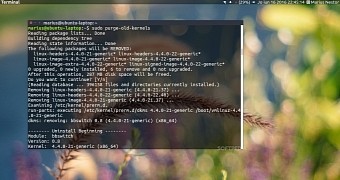Dustin Kirkland, Ubuntu Product and Strategy at Canonical, has informed the community about a simple method of helping them remove old kernels from Ubuntu Linux, thus freeing up a lot of disk space.
Ubuntu is a great OS and all that, but it has this problem that it kinda of stores many old kernel versions on the partition where it is installed. So after some time when you keep on updating your operating system to newer kernel versions, you'll notice that your disk drive runs out of free space.
If you're a beginner, you start wondering what's going on, asking questions like "Where's my disk space disappearing?" And this does matter when you're running Ubuntu from an SSD, which usually comes in smaller sizes than the traditional hard disk drives (HDD), those of 120GB being the most popular ones.
I am a long-time Ubuntu user, and if you're like me, you know some tricks that you need to do from time to time, via the command-line, to remove those pesky old kernels that APT package manager's "apt-get autoremove" command fails to remove after installing new ones.
Here's how to remove old kernels and free disk space in Ubuntu
There's a tool out there called purge-old-kernels, and it was created by Canonical's Dustin Kirkland. It's all you need to solve the problem where the /boot directory won't get filled with vmlinuz kernels and prompt you with a super annoying message that you are running out of disk space on /boot.
"If you have long-running Ubuntu systems (server or desktop), and you keep those systems up to date, you will, over time, accumulate a lot of Linux kernels," said Dustin Kirkland. "Over time, you might find your /boot directory filled with vmlinuz kernels, consuming a considerable amount of disk space."
Not removing those old kernels also causes a lot of other problems, such as the inability of new kernel versions to be installed. So installing the purge-old-kernels tool will save you a lot of time and energy. It is available in the Ubuntu 16.04 LTS (Xenial Xerus) repository as part of the byobu package.
To install and use purge-old-kernels to remove old kernel versions from Ubuntu 16.04 LTS, open the Terminal app and run the following commands. First, you'll install the byobu package, and then you will execute purge-old-kernels with administrative privileges, which will remove the old kernels.
sudo apt install byobu
sudo purge-old-kernels
That's it! Once you run purge-old-kernels, it will take some time to remove the old kernel verions, as well as various third-party kernel modules that were built against the respective Linux kernel versions for the software that required them. The purge-old-kernels is also available for other Ubuntu versions from this GitHub page.
The awesome part of using the purge-old-kernels utility is that, by default, it will keep the last two kernels, just in case you're running into some boot issues with the latest version installed. Of course, you can overwrite that by using the "--keep" parameter.

 14 DAY TRIAL //
14 DAY TRIAL //